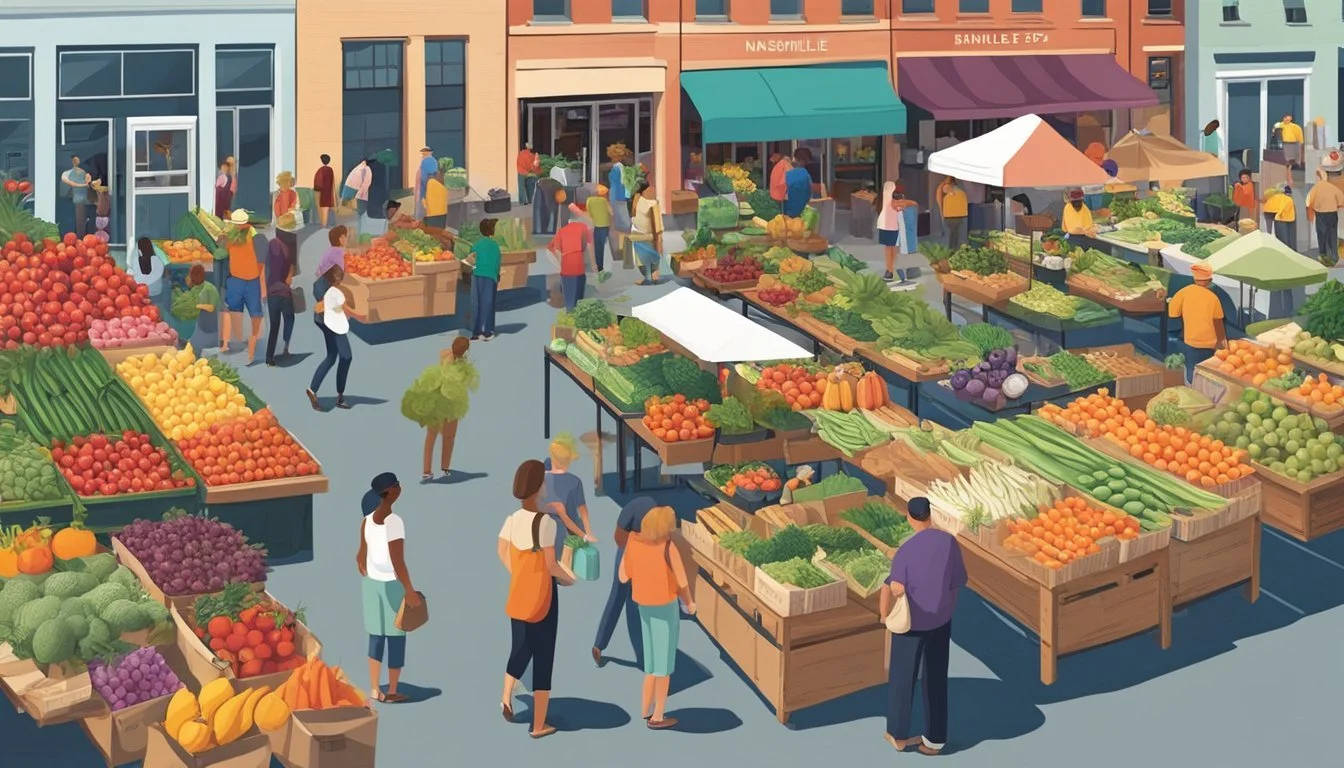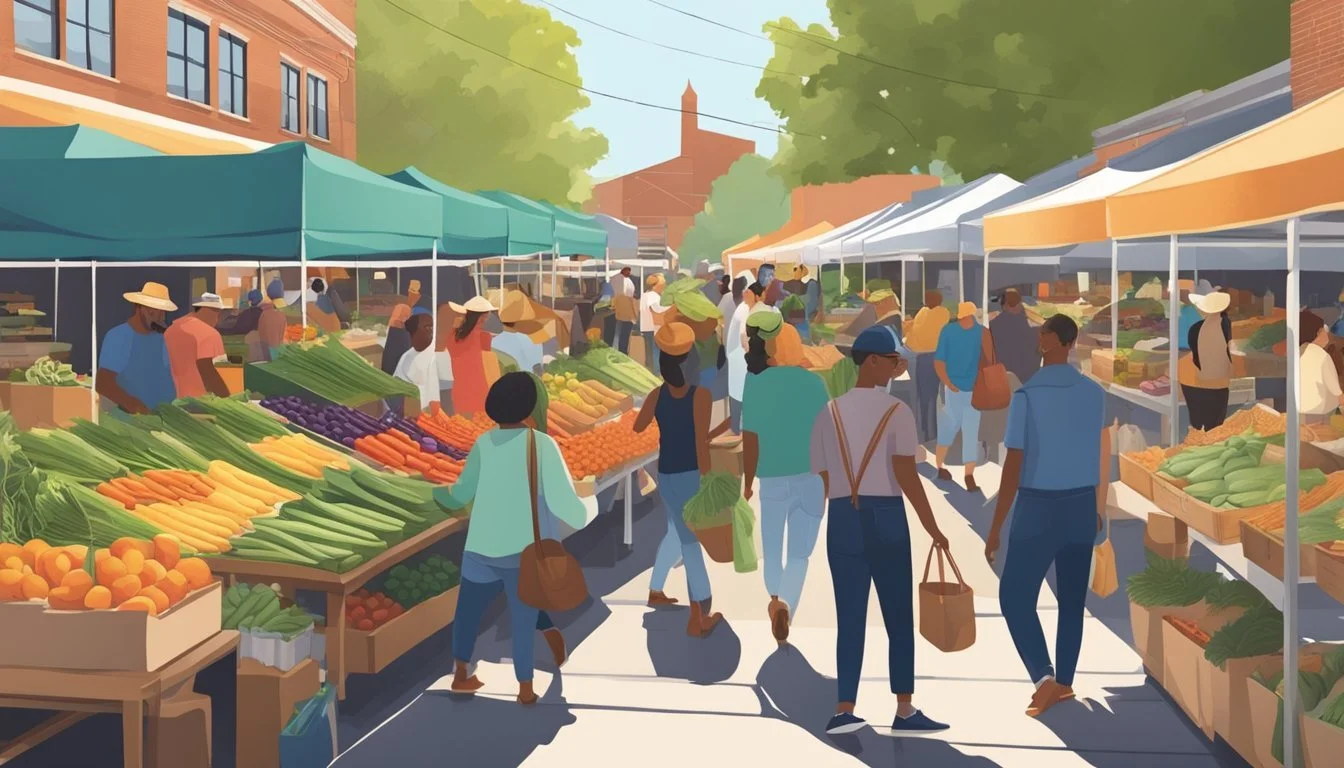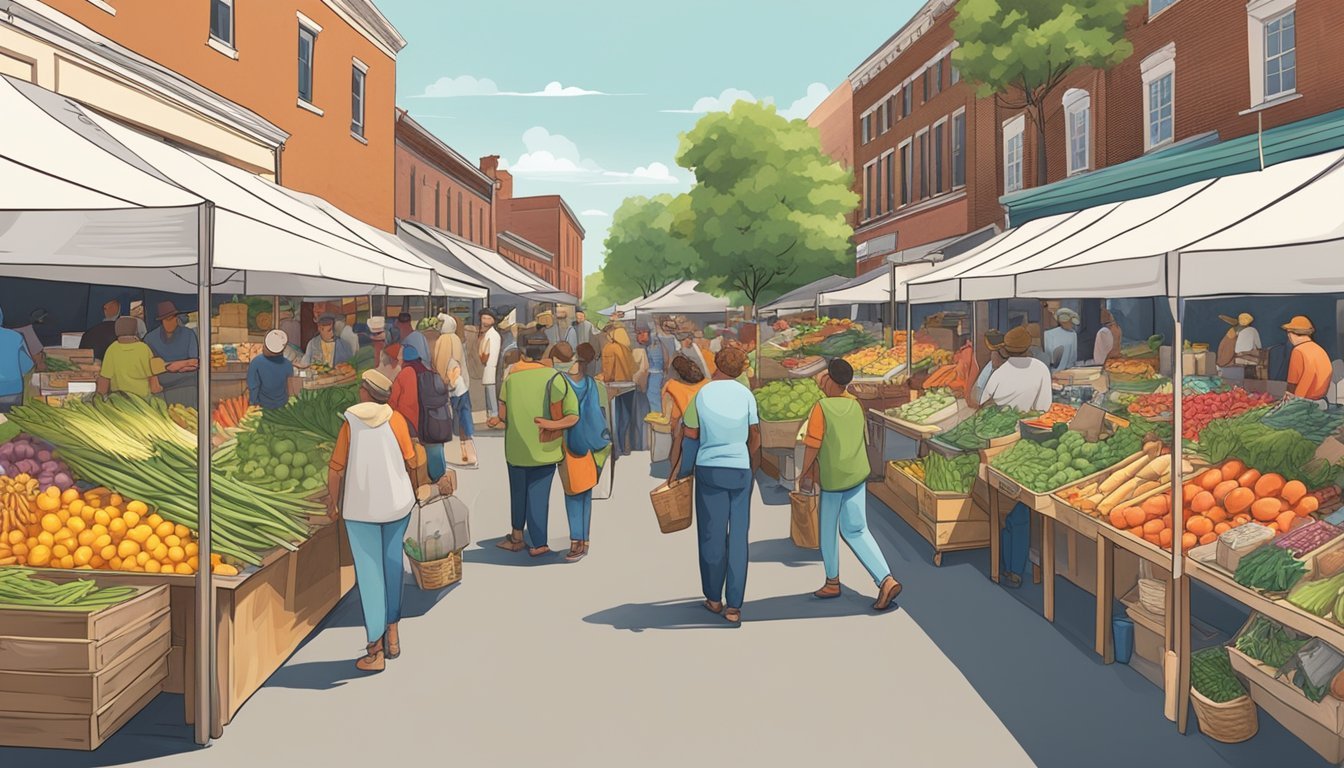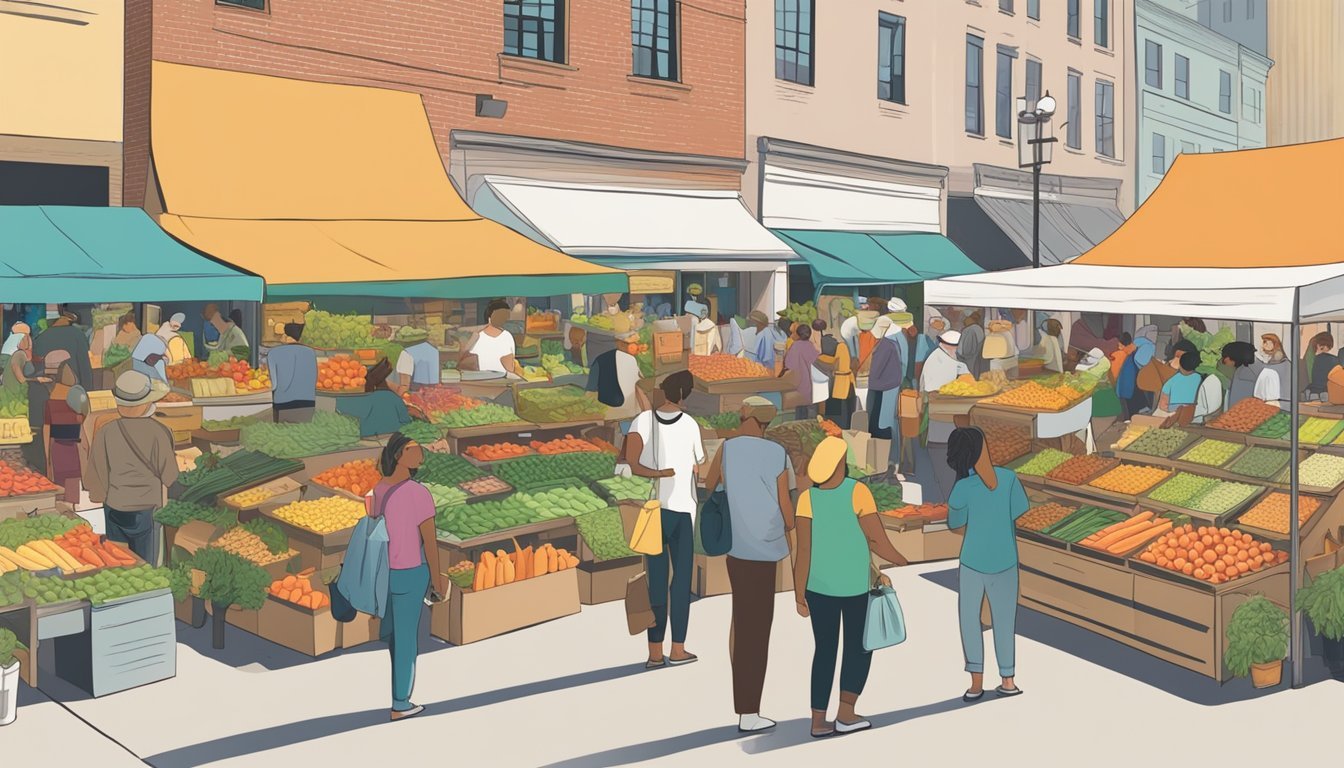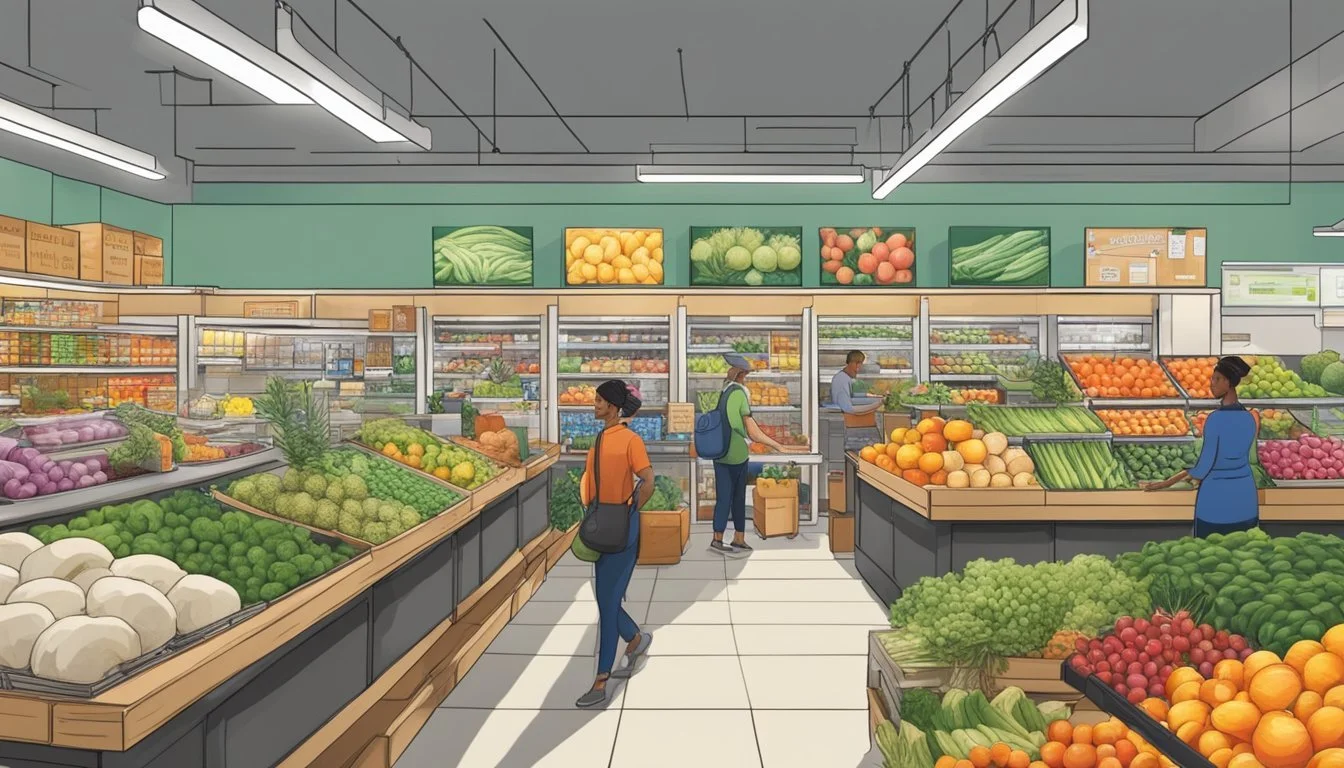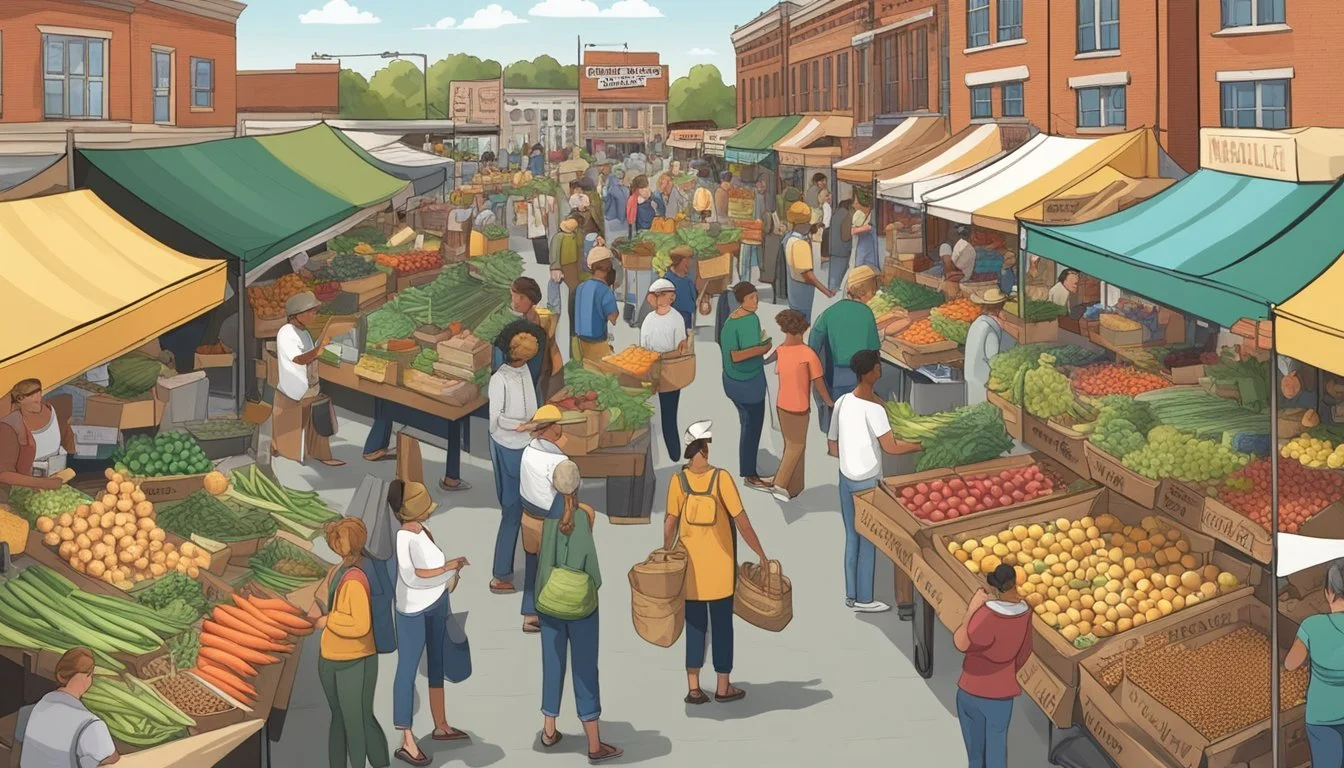Guide to Food Co-Ops in Nashville, TN
Navigating Your Local Options
Nashville has become a beacon for sustainable eating and community-supported retail, and food co-ops are at the heart of this movement. A food co-op, or cooperative, is a food distribution outlet organized and owned by its members, who make decisions democratically and share profits. In Nashville, food co-ops are dedicated to providing local, sustainably sourced products, establishing a direct link between producers and consumers, and reinforcing local economies.
Food co-ops in Nashville stand out for their commitment to community and sustainable operations. They differ from conventional grocery stores by prioritizing people over profits and building relationships with local farmers. Members and non-members alike are drawn to these establishments for bulk shopping options, which reduce waste and plastic use, and for the assurance that they are supporting their local community.
The appeal of Nashville's food co-ops doesn't end with sustainability; it also extends to the local and often organic produce, dairy, and meats available to consumers. These co-ops are more than just grocery stores; they are partnerships and communities in themselves, aiming to be a one-stop shop for conscientious consumers looking to support local businesses and make environmentally friendly choices. With options just minutes away from downtown Nashville and in neighboring areas, these establishments bring farm-to-table within reach for a growing number of residents.
History of Food Co-Ops in Nashville
Food cooperatives have made a notable impact on Nashville, offering a communal approach to purchasing food with an emphasis on local sourcing and democratic operation. The Nashville Food Co-op is an exemplar, tracing its origins to a group inspired by the prevalence and success of co-ops in Vermont. These founding members aimed to replicate the integrated food system observed in that region.
Early Beginnings
The first notable food cooperatives in Nashville drew inspiration from the mutual aid societies of the late 18th century. They operated on:
Democratic control: Each member had an equal say in how the cooperative was run.
Autonomy and independence: The ability to operate without external control.
Community focus: Prioritizing the needs and welfare of the local community.
By valorizing these principles, the Nashville Food Co-op and similar entities foster an environment where the community can engage directly in the food economy.
Development Over Time
In its initial developmental phase, the Nashville Food Co-op evolved from just an idea to a community cornerstone. It embraced cooperative values to ensure that local farmers, artisans, and food producers could benefit directly from local sales, as opposed to the less than 2% of local food products represented in national grocery sales. Their community-centric approach aimed to resonate with Nashville’s ethos of support and interconnectedness.
Present-Day Impact
Today, the Nashville Food Co-op thrives as a beacon of cooperative ideals. It has harnessed a loyal community following by promoting local impact and providing a marketplace that reflects the city's diverse palate and community spirit. They have continuously demonstrated that a cooperative model is not just a niche alternative but a sustainable model for urban centers like Nashville.
Benefits of Joining a Food Co-Op
Joining a food co-op in Nashville presents numerous advantages to both individual members and the local community. A prominent benefit is the ability to access local food. Food co-ops prioritize sourcing produce from local farmers, which ensures freshness and supports the regional economy.
Food co-ops often offer organic options. Customers can enjoy a wide array of certified organic products, aligning with a commitment to healthier living and sustainable agricultural practices.
Members may receive discounts on purchases, which renders quality food more affordable. Discounts are one of the financial incentives of co-op membership, alongside exclusive deals and member-only sales.
Ownership is a defining feature of a co-op. Members become part-owners of the establishment, providing them a voice in business operations, product selection, and other decisions. This democratic structure fosters a sense of community involvement and accountability.
Finally, food co-ops are designed to improve access to nutritious foods. Educational programs on food systems and healthy eating classes are frequently offered, contributing to a better-informed public.
By joining a food co-op, individuals play a role in a larger movement that champions sustainability, education, and community development, all while enjoying the tangible benefits of membership.
How to Find and Choose a Co-Op
When searching for a food co-op in Nashville, TN, individuals should consider location, supplier relationships, and the co-op’s operational ethos. In neighborhoods like East Nashville and North Nashville, accessibility could be a deciding factor. Shoppers should look for co-ops that align with their own values, whether that's supporting local farmers or prioritizing sustainability.
Location: Start by mapping out co-ops in relation to where you live or work. A co-op in close proximity makes regular shopping trips more convenient.
Supplier Partnerships: Investigate each co-op’s list of suppliers. A strong network of local farmers and producers denotes fresh, seasonal goods and community support.
Community Involvement: Determine the level of community ownership. Co-ops with high community involvement often mirror the desires of their members more closely and foster a sense of camaraderie.
Sustainability Practices: Evaluate the co-op’s dedication to sustainable operations. Many co-ops incorporate eco-friendly practices, reducing the environmental impact of your shopping routine.
When considering these factors, it’s important to visit each co-op. Speak with members and staff, and observe the variety and display of products. Co-ops that cultivate a transparent and informative shopping environment often stand out as reliable choices.
One should not underestimate the power of word-of-mouth. Speaking with residents in East and North Nashville may reveal anecdotal experiences about different co-ops. Finally, check for events or tours that can provide a deeper insight into how each co-op upholds its values and serves the community.
Guide to Nashville's Food Co-Op Scene
Nashville's Food Co-Op scene thrives on a cooperative model, integrating local farms, seasonal products, and community-focused events to cultivate a sustainable ecosystem.
Local Farms and Suppliers
The foundation of Nashville's Food Co-Ops is their partnership with local farms and suppliers. These co-ops have established connections with regional growers to source a vast array of fresh, high-quality products. Farmers markets and CSAs (Community Supported Agriculture) are integral parts of this framework, providing venues where consumers can directly support local agriculture.
Farmers Markets: Key locations where co-ops source fresh produce.
CSAs: Collaborative platforms between consumers and farms for seasonal harvests.
Seasonal Product Offerings
Nashville's co-ops are committed to offering seasonal produce which not only supports sustainability but also ensures that consumers receive food at its peak for flavor and nutrition. They educate members on what is currently in season and typically available:
Spring: Tender leafy greens, radishes, and strawberries.
Summer: Juicy tomatoes, sweet corn, and robust zucchinis.
Fall: Hardy squashes, crisp apples, and earthy root vegetables.
Winter: Hearty greens, such as kale and collards, and a variety of potatoes.
Community Events and Workshops
To deepen the cooperative spirit, Nashville Food Co-Ops often organize community events and educational workshops. These gatherings are not only about learning but also about strengthening the community:
Workshops: Topics might include sustainable farming, nutrition, and seasonal cooking.
Events: Social mixers, local vendor fairs, and farm-to-table dinners.
By maintaining a focus on local, seasonal, and community-driven initiatives, Nashville's Food Co-Op scene represents a vibrant and essential part of the city's food culture.
Membership and Ownership in Co-Ops
Food cooperatives in Nashville exemplify a business model where ownership and control are equally distributed among its members. These members are typically local residents who wish to have access to quality, locally-sourced food while also having a stake in the community-oriented business.
Membership in these co-ops is open and voluntary; it eliminates discrimination, allowing anyone who aligns with the co-op's goals to join. Here’s how membership typically works:
Members are co-owners with equitable stakes in the cooperative.
They have access to the co-op's resources and products.
Ownership confers a say in major business decisions, often through a democratic voting process.
The concept extends beyond just food access; it creates a powerful community nexus. The cooperative structure ensures that every member’s voice can be heard and that their participation matters.
Financially, being part of a co-op is akin to being part of a credit union―it's a more personal alternative to traditional corporations or chains. Members often receive discounts or share in the profits through surplus revenue returns, which are proportionate to their usage of the co-op's services.
The table below highlights the core advantages members enjoy:
Advantage Description Democratic Control Members vote on significant policies and decisions. Economic Participation Members may receive dividends or discounts. Community Building Strengthening local economies and fostering social bonds.
In essence, membership and ownership in Nashville food co-ops translate to increased buyer power, sustainable community impact, and financial incentives that enrich the overall cooperative ecosystem.
Exploring Nashville's Culinary Delights Through Co-Ops
Nashville's food co-ops provide a unique gateway to explore the city’s culinary culture, offering exclusive products and forming critical partnerships with local restaurants.
Co-Op Exclusive Products
Food co-ops in Nashville tend to stock an array of exclusive products that celebrate local ingredients and artisanal craftsmanship. Shoppers can find Sean Brock's heritage grains, which are a staple in the pantry of discerning home cooks and professionals alike. These grains often make their way into quintessential Nashville dishes like hot chicken and barbecue, allowing gastronomes to replicate the nuances of these flavors at home. Additionally, fresh produce sourced from nearby farms provides the key components for homemade pizza adorned with heirloom tomatoes or a vibrant salad to enjoy on a sunny patio.
Partnerships with Nashville Restaurants
Partnerships between Nashville’s food co-ops and restaurants enrich the city's dining scene. For instance, Audrey, known for its innovative take on Southern cuisine, sources ingredients from co-ops to ensure the quality and locality of their dishes. Such collaborations often mean that seasonal menus are flush with co-op-sourced components, bringing a farm-to-table experience directly to the restaurant-goer. Co-ops may also feature ready-to-eat meals crafted in concert with local culinary talents, providing a taste of Nashville's food culture that is rooted in community and sustainability.
Special Features of Nashville's Co-Ops
Nashville's food co-ops stand out through their commitment to the community and sustainability. One key feature is the prioritization of local food. These co-ops often partner with local farmers, artisans, and food producers to ensure a market for their goods, translating into more opportunities within the local economy. Not only does this support the local industry, but it also guarantees access to fresh, locally-sourced products for Nashville's residents.
Organic Offerings: Consumers have a growing interest in organic products, and Nashville's food co-ops cater to this demand by providing a variety of organic fruits, vegetables, dairy, and spices.
Bulk Shopping: To reduce waste and promote sustainability, many co-ops offer bulk shopping options. This allows customers to purchase the quantity they need and minimize packaging waste.
Regarding discounts and savings, co-ops often employ a membership model where members can receive discounts on purchases. These can include savings on grocery store staples as well as specialty items.
In the realm of specialty products, some co-ops in Nashville may offer a curated selection of beer, showcasing local breweries and offering unique and difficult-to-find craft beers.
Lastly, co-ops are not simply grocery stores; they are hubs of community activity. They are built and operated with a focus on people over profits, dedicated to serving the needs of their members and the Nashville community at large. By shopping at a co-op, customers are not just buying groceries—they're investing in their community, helping to grow the local food system, and supporting sustainable practices.
Events and Educational Opportunities at Co-Ops
Food co-operatives in Nashville offer a wealth of events and educational opportunities for their community members. These gatherings are pivotal in building a collective understanding of sustainable food practices and in bolstering local food systems.
Workshops
Educational workshops are often at the heart of a co-op's event calendar. They provide an interactive experience for participants to learn about subjects such as:
Organic farming techniques
Cooking classes featuring seasonal produce
Nutrition and food preparation
Budget-friendly and waste-reducing shopping tips
Community Meetings
Regular community meetings are a staple, ensuring member involvement in decision-making processes. They serve to reinforce the cooperative principle of democratic member control and enrich the member's co-op experience.
Seasonal Events
Co-ops frequently host seasonal events to highlight local harvests and celebrate the array of local products available. These can include:
Spring planting festivals
Summer farmer's markets
Fall harvest celebrations
Winter holiday-themed local food drives
Educational Series and Talks
Members have access to a range of educational series and expert talks that discuss:
The importance of supporting local growers
The impact of food choices on health and environment
Ways to engage with and support the co-op model
Through these educational and participatory events, Nashville’s food co-ops aim to work collaboratively with members to foster a knowledgeable community that values sustainability and local sourcing. Co-op events are more than just gatherings; they're an investment in the education and unity of the community at large.
Nashville's Co-Op Influence on Local Cuisine
Nashville's food co-ops actively engage in the local culinary scene, contributing to its diversity and quality. They prioritize sourcing ingredients from local growers and artisans, which brings a fresh perspective to traditional Southern cooking.
Hot Chicken, a Nashville staple, gains additional authenticity and flavor when chefs use locally-sourced poultry. The co-ops enable them to access fresh, regional chicken, enhancing the dish’s spicy and savory profile.
For a classic Southern Breakfast, ingredients like eggs and bacon are elevated through the co-op's network of local farmers. These partnerships assure that staples like Biscuits can be made with organic flour and butter, reflecting a true farm-to-table experience.
The delivery of farm-fresh produce and meat to the co-op also influences the preparation of other Southern classics like Oxtail, providing chefs with the freshest cuts of meat, which is crucial for the slow-cooked dishes synonymous with Southern comfort food.
Regarding Whiskey, local co-ops celebrate the spirit's rich tradition in Tennessee by supporting distilleries nearby. These partnerships promote the availability of locally-made whiskey in food pairings and cooking, further embedding the co-op in Nashville's food culture.
Co-op sourced ingredients have even found their way into restaurants associated with James Beard nominees like Trevor Moran, where a high standard for ingredient quality and ethical sourcing mirrors the co-op philosophy.
Highlighted by local co-ops:
Hot Chicken: Local poultry enhances authenticity.
Southern Breakfast: Farm-to-table eggs and bacon.
Biscuits: Organic, local flour and butter.
Oxtail: Fresh, regional meat for slow-cooked dishes.
Whiskey: Co-op support for local distilleries.
Through their support of local suppliers, Nashville’s food co-ops not only influence the culinary scene but also foster an environment where Southern cooking continues to evolve and thrive.
Integrating Food Co-Ops with Nashville's Culture
Food co-ops in Nashville play a pivotal role in mirroring the city's vibrant culture, connecting the dots between local music, community development, and the ethos of Nashville's residents.
Co-Ops and Local Music
In Nashville, often referred to as 'Music City', the local food co-ops become gathering spots that echo the rhythms of the city. They often highlight local musicians by featuring live performances, integrating the soul of country music into their atmosphere. This synergy promotes a unique shopping experience, one that encapsulates the musical heritage of the city and supports local artists.
Music Events: Co-ops may host weekly music nights featuring local country artists.
Local Talent: Shelves might carry products that celebrate Music City, from country-themed packaging to local musician endorsements.
Co-Ops and Community Development
Food co-ops represent more than just a grocery store; they serve as communal hubs where Nashvillians unite over shared values of sustainability and equity. By focusing on locally-sourced cuisines and products, co-ops propel the local economy and reinforce the importance of community.
Support for Local Farmers:
Increased opportunity and income for local farmers
Closer connection between consumers and their food sources
Community Engagement:
Educational programs on equitable and sustainable food systems
Spaces for community meetings and local events
Food co-ops adapt seamlessly to Nashville's atmosphere, fostering connections not just between people and their food, but among the citizens themselves, nurturing the community's development.
Future of Food Co-Ops in Nashville
The city of Nashville is witnessing a progressive movement in the local food landscape, with the advent of community-focused food co-operatives (co-ops). These co-ops foreground sustainability, leveraging Nashville's culinary diversity, including its iconic Nashville Chicken, and integrating it into a model that champions local produce.
Construction efforts of these co-ops emphasize environmentally friendly practices and aim to provide a platform for local farmers to connect with the community. This enables the freshest produce to be made available directly to consumers, while natively supporting the local economy.
In the Local Food arena, the co-ops in Nashville are setting a precedent for shopping experiences that are not only transactional but also ethical and community-oriented. They promote bulk shopping options, which further supports waste reduction initiatives.
The co-op framework is ensuring the future of Nashville's food scene is Cooperative in nature, highlighting the importance of food choices that are jointly beneficial for consumers, producers, and the environment.
Key Elements Impact on Food Co-Ops Culinary Diversity Utilizes Nashville's rich food culture Farmers Markets Forges partnerships for fresh, local foods Local Food Encourages support of neighborhood farms Cooperative Structure Member-owned focusing on people over profits
By integrating tightly with the city's culinary ethos and the residents’ commitment to local markets, food co-ops in Nashville are poised to redefine the future of community grocery shopping in an empowering and sustainable way.
Support Resources and Networks
In Nashville, TN, food co-ops play a pivotal role in creating a sustainable ecosystem for both consumers and local growers. These cooperatives are community-owned, highlighting the principle of collective ownership. They grant the community the ability to shape their food sourcing and consumption experience. The Nashville Food Co-op exemplifies this model, aiming to provide a constant supply of locally-sourced food to Nashvillians, while supporting local farmers with a stable source of income throughout the year.
Community access to nutritious food is bolstered through a network of food pantries and support services. Several food assistance programs in Davidson County offer a safety net to a diverse range of residents including low-income families, single mothers, and individuals with disabilities.
Here is a brief overview of resources available:
Nashville Food Co-op: Focused on sustainable operation and local sourcing, this co-op is a powerful resource for community members interested in joining a community-centric food network.
Emergency Food Programs: Organizations such as United Way and local food pantries provide immediate aid. Contact information is often available online, or services can be reached by calling 2-1-1.
Legal Aid and Counseling: For troubles extending beyond food insecurity, such as healthcare, housing, or employment challenges, the Legal Aid Society offers resources, including a COVID-19 support page.
Food Pantry Networks: Comprehensive lists of food pantries in Nashville offer access to necessary assistance, ensuring that no resident goes without food regardless of circumstances.
It's advisable for those in need of support, or individuals looking to contribute to the co-op, to reach out via the relevant email or contact numbers provided by these organizations for detailed information and assistance.
FAQ: Co-Ops in the Music City
What is a Food Co-Op?
A Food Co-Op in Nashville, referred to as a co-op, is a grocery model where consumers can purchase locally sourced produce and products. They operate on a system where members often have ownership, giving them a voice in the co-op's policy and operation.
Why shop at a Co-Op?
Local Food: Shopping at a co-op supports local farmers and producers, ensuring access to fresh, seasonal produce.
Ownership: Co-Op members share in the ownership, leading to a more engaged and invested community.
Are all Co-Ops in Nashville Member-Only?
No, while some co-ops require a membership, others are open to the general public. Membership can provide additional benefits, such as discounts or voting rights.
Where can I find a Co-Op in Music City?
Co-ops are spread throughout Nashville, offering various food options. For the latest list, it's best to search online or visit a local community board.
What should I expect in terms of product range?
Expect a focus on health-conscious, organic, and package-free options. Selections often celebrate the local flavors and culinary traditions of Nashville.
To join or support a co-op in Nashville, residents can start by visiting local co-ops to learn about membership benefits and community impact. Engaging with co-ops contributes to a vibrant local food scene in Music City.
Glossary of Co-Op Terms
Cooperative (Co-op): A cooperative is an autonomous association of persons who voluntarily cooperate for their mutual, social, economic, and cultural benefit. Co-ops often operate according to principles like democracy, with each member having one vote.
Food Co-Op: This is a type of cooperative grocery store that is owned and controlled by the members who shop there. A food co-op focuses on providing high-quality food, often emphasizing local and sustainable products.
Members: Individuals who own and have invested in a cooperative. Members have the right to vote on important matters and make decisions about the operations of the co-op.
Credit Union: Though not directly related to food co-ops, credit unions are member-owned financial cooperatives that provide alternatives to traditional banking. They offer similar services such as savings and loan products.
Grocery Store: A retail store that sells food and other household items. While grocery stores are often large chain businesses, a food co-op functions as a grocery store with the unique characteristic of being cooperatively owned and operated by its members.
In the context of a food co-op in Nashville, TN:
Community Ownership: The unique feature of food co-ops wherein the members are the owners, ensuring that the focus remains on meeting the needs of the community rather than solely on profits.
Sustainability: A core value where food co-ops partner with local farmers, reduce waste, and offer bulk shopping options to encourage more environmentally friendly consumer habits.
Conclusion
Food co-ops in Nashville offer a unique shopping experience, emphasizing community involvement and local sourcing. They are more than just a place to purchase groceries; they are a way for residents to invest in the local economy and have a say in the products and operations of the store. Members can take pride in knowing they are supporting their neighbors' businesses.
Key Highlights:
Community Support: Food co-ops in Nashville help to keep money within the local community. Membership fees and profits often go back into improving the co-op or as dividends to its members.
Local Produce Availability: They provide access to seasonal, locally-sourced produce, meats, and dairy, reinforcing the commitment to sustainable living.
Democratic Control: The unique structure of co-ops ensures that members have voting rights and a voice in major decisions, fostering a true sense of ownership and accountability.
Customers can revel in the knowledge that by shopping at a food co-op, they are participating in a sustainable, economically supportive system that benefits all stakeholders. Nashville's food co-ops stand as a testament to the strength of a community united by the love for good food and local prosperity. These co-ops are not just stores but pillars of community support and engagement, offering an enriched food shopping experience.
Additional Resources
Nashville offers a diverse array of food co-ops, and both residents and visitors have access to several resources that enhance their food co-op experience.
Nashville Food Co-op Nashville Food Co-op is a cornerstone for local food enthusiasts, emphasizing locally-sourced, seasonal products. The co-op provides a sustainable source of income for local growers and fosters community ownership.
Website: Nashville Food Co-op
Location: Nashville, TN
Focus: Locally-sourced, seasonal food, community ownership
Cooperatives & Mutual Aid Mutual aid initiatives bolster the food co-op ecosystem, meeting diverse community needs. These programs facilitate collaboration, sharing, and support among members.
Information: Access through Nashville Food Co-op's cooperatives and mutual aid webpage
United Way A nationwide organization that supports local communities, including those in Nashville, with essential services ranging from food assistance to healthcare.
Help Line: Call 2-1-1
Website: United Way
Food Pantries and Assistance Programs Several food banks and pantries offer free food and related services in Nashville. Catholic Charities and other groups maintain food banks, soup kitchens, and additional assistance.
Example: Catholic Charities
Location: 2806 McGavock Pike, Nashville, TN 37214
Contact: 615-352-3087
Community Food Advocates This entity works to ensure that the Nashville community has access to affordable, nutritious foods and supports food policy improvements.
Address: 604 Gallatin Road Suite 211, Nashville, TN 37206
Contact: 615-...
Cuisines and Price Points Food co-ops feature an assortment of cuisines reflective of Nashville's culinary diversity, with options spanning various price points to accommodate different budgets.
For individuals exploring the robust and dynamic food culture of Nashville, these resources serve as gateways to food security, community, and diverse culinary experiences.
Acknowledgments
The Nashville food co-op scene is a vibrant example of community collaboration and support. Acknowledgment is due to various entities that play a crucial role in this ecosystem.
Nashvillians, at the heart of it, are the essential supporters and members who bring life to the co-ops. They not only patronize these establishments but also own and govern them, establishing a shared experience around food that is integral to the co-op's success.
Community ownership is a cornerstone of the co-op business model, demonstrating a mutual belief in the strength of a locally-focused economy. This common goal fosters a unique bond among members who participate in the cooperative's decisions.
Local farmers provide the bedrock of the supply chain with their seasonal, locally-sourced produce, meats, and dairy. They receive a sustainable source of income thanks to the year-round support from the co-ops, creating a symbiotic relationship that benefits the entire community.
Entity Contribution Nashvillians Membership, governance, and support Community Shared decision-making and economic support Local Farmers Providing fresh, sustainable food sources
Each group's contribution fuels a cooperative's ability to operate sustainably and acknowledges the collective effort that underpins the co-op's existence. Through this system, the Nashville Food Co-op exemplifies the positive impact of a united approach to local commerce and community wellness.
Contact Information
For individuals interested in connecting with the Nashville Food Co-Op, specific contact information facilitates direct communication and prompt support. The Co-Op is in the process of establishing a permanent presence in Nashville and is currently garnering membership to reach its startup phase goals.
Nashville Food Co-Op
General Inquiries:
Email: For general information, people can reach out via the designated email address provided on the Co-Op's official website or social media profiles.
To stay updated on the progress of the Nashville Food Co-Op, individuals are encouraged to follow their social media accounts where updates about memberships, location, and opening dates are frequently posted. Enthusiasts also have the opportunity to contribute to the Co-Op's development by becoming Co-Owners and participating in community outreach.

